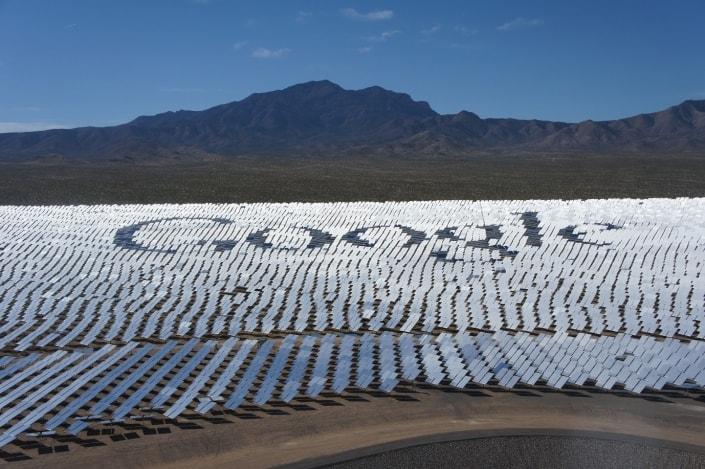Major tech companies like Google, Facebook, and Amazon are increasingly embracing renewable energy sources – like solar – to meet their growing energy demands.
As major tech companies grow in influence and ubiquity, the footprint of their energy-guzzling data centers also continues to expand. The data stored and transmitted through these data centers help to keep the global economy humming and the human experience pleasant in the Digital Age. The critical role that these data centers play in improving our quality of life, however, comes at a cost.
In 2014, data centers consumed an estimated 70 billion kWh of electricity, equivalent to the energy consumed by 6.4 million average American households that year. The energy consumption figure for data centers is expected to grow to 73 billion kWh by 2020. Efficiency improvements in data storage have slowed the consumption patterns of data centers somewhat, compared to the previous decade, but critics still decry their massive energy consumption habits.
In an effort to combat public scrutiny and be more socially responsible in their business practices, tech firms are increasingly turning to renewable energy sources to meet their out-sized energy needs. This trend is having a significant ripple effect on the broader industrial energy market in the U.S. as more and more mainstream companies follow the lead of Big Tech and flood the renewables market to take advantage of the lower costs that first movers in Big Tech helped to spur.
In 2017, 43 businesses signed long-term agreements for 5.4 gigawatts of clean energy worldwide, a record figure up from 4.3 gigawatts in 2016.
In case there was any doubt about who is leading this new corporate trend towards renewable energy, the top global corporate buyers of renewable energy last year were Google, Amazon, Microsoft, and Apple.
Since 2014, over 100 companies worldwide have committed themselves to a goal of being powered 100% by renewable energy sources. This global initiative called RE100 is representative of the tectonic shift that has occurred in the corporate community in recent decades as the business case and moral case for clean energy grows harder and harder to refute.
In the current political environment, the sustainable energy practices of Big Tech are especially noteworthy, as industry players fill a renewable energy leadership void vacated by the federal government.
As Bloomberg New Energy Finance’s corporate energy strategy analyst, Kyle Harrison, puts it:
“The growth in corporate procurement, despite political and economic barriers, demonstrates the importance of environmental, social and governance issues for companies. Sustainability and acting sustainably in many instances are even more important, for the largest corporate clean energy buyers around the world, than any savings made on the cost of electricity.”
Multi-national tech firms have cemented themselves as the pioneers of this new era of clean energy-inspired corporate responsibility. In the past couple of months alone, tech giants have hit numerous renewable energy milestones.
-Apple: This month, Apple announced that all of its global operations (including retail stores, data centers, and offices) are 100% powered by renewable energy. Apple’s leadership is having positive downstream effects, as 23 of their suppliers have also committed themselves to a goal of operating entirely on renewable energy.
-Microsoft: In March, Microsoft announced the largest corporate purchase of solar power in U.S. history in the form of an agreement with sPower to purchase 315 megawatts of solar-generated electricity in Virginia. Microsoft’s global operations have been 100% powered by renewable energy since 2014.
–Google: Earlier this month, Google announced that their total purchase of energy from renewable sources exceeded, for the first time, the total electricity consumed by its global operations last year. Google is the largest corporate purchaser of renewable energy in the world.
-Facebook: In March, Facebook announced a deal to buy all of the power generated from a 320-megawatt wind farm in Nebraska by 2029 that will eventually power a new data center to be located about 120 miles from the farm. Facebook has a goal of reaching 50% clean and renewable energy in their data center electricity supply mix by the end of this year.
-Amazon: While most of their industry peers are leading the way in purchasing renewable energy, Amazon is a corporate leader in generating their own renewable energy. In SEIA’s 2017 Solar Means Business Report released earlier this month, Amazon ranked 10th among corporate on-site solar energy users. In Amazon’s Q1 financial statements, they revealed that 15 of their fulfillment centers in the U.S. have solar panels affixed to them, and the company is committed to increasing that number to 50 fulfillment centers by 2020.
Major tech firms face more scrutiny these days over their size and influence than every before. While debates on Capitol Hill and elsewhere about the role of Big Tech have merit, much of the enormous progress that the world has achieved in the expansion of the renewable energy sector is owed in part to these companies.
On this topic, at least, Big Tech deserves the good headlines they’ve earned.
Cover photo source: Google







